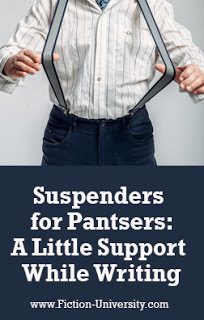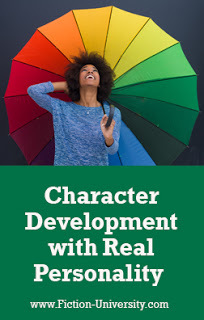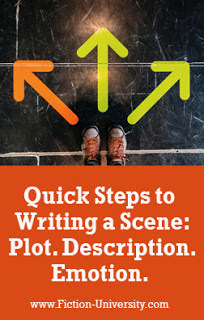Janice Hardy's Blog, page 41
September 3, 2020
Successful Self-Publishing: Build Your Brand
 By Laurisa White Reyes, @lwreyes
By Laurisa White Reyes, @lwreyesPart of The Indie Authors Series
JH: A successful writing career takes more than just writing great books. Laurisa White Reyes shares tips on how to build your author brand, and why it's a critical element of an author's career.
Laurisa White Reyes is the award-winning author of seventeen books, including 8 Secrets to Successful Self-Publishing . She is also the founder and senior editor of Skyrocket Press and teaches English composition at College of the Canyons in Southern California. Visit her website at www.SkyrocketPress.com.
Website | Facebook | Twitter | Goodreads |
Take it away Laurisa...
Continue ReadingWritten by Janice Hardy. Fiction-University.com
Published on September 03, 2020 03:00
September 2, 2020
Are You Showing or Telling Your Internalization?
 By Janice Hardy, @Janice_Hardy
By Janice Hardy, @Janice_Hardy Show, don't tell doesn't just apply to the action in your scenes. It also affects a character's internalization.
When writers worry about showing, not telling, we typically think about the descriptions--the explanations of backstory, infodumps, and the mini-history lessons that "tell" readers what they need to know.
But telling can also occur in a character's internalization. Telling in internalization can distance the reader from the character, creating detachment instead of the closeness good internal thoughts excel at.
These emotional and motivational tells sneak into a manuscript when the author stops the story to explain what's motivating a character to act, or why that character is feeling what she's feeling.
Continue ReadingWritten by Janice Hardy. Fiction-University.com
Published on September 02, 2020 03:00
September 1, 2020
Suspenders for Pantsers: A Little Support for the Pantsing Writer
 By Orly Konig, @OrlyKonig
By Orly Konig, @OrlyKonigPart of The How They Do It Series
JH: If outlining is too strict, but pantsing is too loose, you might consider using some plotting suspenders. Orly Konig shares her in-between process that mixes plotting and pantsing.
Orly Konig is an escapee from the corporate world. Now she spends her days chatting up imaginary friends, drinking too much coffee, and negotiating writing space around her cats. She is the founding president of the Women’s Fiction Writers Association and a member of the Tall Poppy Writers. She’s a book coach and author of The Distance Home and Carousel Beach .
Website | Facebook | Pinterest | Instagram | BookBub | Goodreads
Take it away Orly…
Continue ReadingWritten by Janice Hardy. Fiction-University.com
Published on September 01, 2020 03:00
August 29, 2020
WIP Diagnostic: Is This Working? A Closer Look at Establishing Setting in an Opening Scene
 Critique By Maria D'Marco
Critique By Maria D'MarcoWIP Diagnostics is a weekly column that studies a snippet of a work in progress for specific issues. Readers are encouraged to send in work with questions, and we diagnose it on the site. It’s part critique, part example, and designed to help the submitter as well as anyone else having a similar problem.
If you're interested in submitting to WIP Diagnostics, please check out these guidelines.
Submissions currently in the queue: Three
Please Note: As of today, critique slots are booked through September 19.
This week’s questions:
1. Does this work for an opening scene?
2. Does it orient you, grab attention, make you want to read on?
Market/Genre: Women’s Fiction
On to the diagnosis…
Continue ReadingWritten by Janice Hardy. Fiction-University.com
Published on August 29, 2020 04:29
August 27, 2020
Character Development with Real Personality
 By Jacqueline Myers
By Jacqueline Myers
Part of The How They Do It Series
JH: Knowing who your character truly is can help you undersyand how they'll act in your story. Jacqueline Myers shares personality theory is a writer's best friend when creating characters.
Jacqueline is currently happily at work on her second mystery series (under a pen name, Gilian Baker) while sharing what she's learned with other writers. Using the synergy of personality theory and brain science, Jacqueline coaches writers using a proprietary methodology that helps them overcome their debilitating creative blocks so they can write un-put-down-able books.
If you are struggling, she'd love to see how she can support you! Schedule your free story strategy session here. You can also email her at jacqueline@intuitivewritingcoach.com.
Grab her first cozy mystery, Blogging is Murder, for FREE here.
Take it away Jacqueline…
Continue ReadingWritten by Janice Hardy. Fiction-University.com
Published on August 27, 2020 03:00
August 26, 2020
Quick Steps to Writing a Scene—Plot. Description. Emotion.
 By Janice Hardy, @Janice_Hardy
By Janice Hardy, @Janice_Hardy Writing in quick steps can help you knock out a scene fast.
I may have wound up an author, but I started out as an artist. I drew (and wrote) since I was a little kid, and later, I went to school for design. Because if this background, I approach writing the same way I approach drawing or designing a layout.
First, I sketch it out.
Then, I fill in the sketch.
Finally, I add the detail and polish.
This simple three-step process has served me well for longer than I’d like to admit in public (grin). I write a minimum of three drafts of every novel—the sketch, the filling it out, and the detail and polish. It’s a layered approach that captures an idea and gets the story down so I know what I have before I really dig into it.
Continue ReadingWritten by Janice Hardy. Fiction-University.com
Published on August 26, 2020 03:00
August 25, 2020
What Doesn’t Work? Learning from the Mistakes of Even the (gasp!) Greats
 By Bonnie Randall
By Bonnie RandallPart of The How They Do It Series
JH: Some authors are bestsellers in spite of gaffs in their writing, not because of them. Bonnie Randall share a few things to avoid--even if a Big Name Author does it.
Stephen King said “If you don’t have the time to read, you don’t have the time (or the tools) to write” and it’s true. Writers collect ribbons of prose, excellent syntax, and well-executed transitions like precious stones in a jar, for once you’re a writer you can never be ‘just’ a reader again. Your eye becomes keenly honed for what works.
It’s also honed for what stinks.
Right now I am reading a novel by someone pretty prolific and very famous, and what I enjoy about their work is the mastery of pacing and plotting.
Continue ReadingWritten by Janice Hardy. Fiction-University.com
Published on August 25, 2020 03:00
August 22, 2020
WIP Diagnostic: Is This Working? A Closer Look at Creating Hooks in a YA Opening
 Critique By Janice Hardy, @Janice_Hardy
Critique By Janice Hardy, @Janice_HardyWIP Diagnostics is a weekly column that studies a snippet of a work in progress for specific issues. Readers are encouraged to send in work with questions, and we diagnose it on the site. It’s part critique, part example, and designed to help the submitter as well as anyone else having a similar problem.
If you're interested in submitting to WIP Diagnostics, please check out these guidelines.
Submissions currently in the queue: Two
Please Note: As of today, critique slots are booked through September 5.
This week’s questions:
1. Does it give enough of a hook, yet holds back to give a sense of mystery?
2. Does the narrator sound like a 17 year old teen?
3. Any comments on improvement in description?
Market/Genre: Young Adult Fantasy
On to the diagnosis…
Continue ReadingWritten by Janice Hardy. Fiction-University.com
Published on August 22, 2020 05:36
August 18, 2020
Cut to the Chase: Tools for Revision
 By Rochelle Melander, @WriteNowCoach
By Rochelle Melander, @WriteNowCoachPart of The How They Do It Series
JH: Starting a revision can be can leave you feeling overwhelmed. Rochelle Melander shares tips on how and where to start your revision.
Rochelle Melander is a speaker, professional certified coach and the author of 11 books for adults, including Write-A-Thon: Write Your Book in 26 Days (and Live to Tell About It) and Level Up: Quests to Master Mindset, Overcome Procrastination and Increase Productivity .
Website | Goodreads | Facebook | Twitter | Instagram
Take it away Rochelle…
Continue ReadingWritten by Janice Hardy. Fiction-University.com
Published on August 18, 2020 04:07
August 15, 2020
WIP Diagnostic: Is This Working? A Closer Look at Adding a Hook to the First Page
 Critique By Janice Hardy, @Janice_Hardy
Critique By Janice Hardy, @Janice_HardyWIP Diagnostics is a weekly column that studies a snippet of a work in progress for specific issues. Readers are encouraged to send in work with questions, and we diagnose it on the site. It’s part critique, part example, and designed to help the submitter as well as anyone else having a similar problem.
If you're interested in submitting to WIP Diagnostics, please check out these guidelines.
Submissions currently in the queue: Two
Please Note: As of today, critique slots are booked through August 29.
This week’s questions:
1. Is the beginning interesting enough to want to read more?
2. Is this in Freddy’s POV? Or is it more of a narrative?
3. Is this age appropriate for middle or elementary readers?
4. If the beginning isn’t yet a hook how in the world can I make it more interesting?
Market/Genre: Middle Grade
Note: This is a re-submission. Check out the previous submission if you’re curious how the author revised.
On to the diagnosis…
Continue ReadingWritten by Janice Hardy. Fiction-University.com
Published on August 15, 2020 05:52



